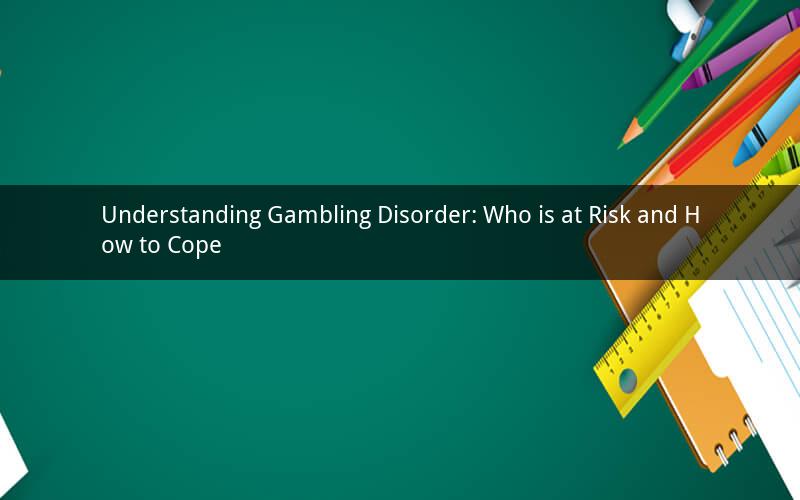
Introduction:
Gambling disorder, also known as problem gambling, is a serious condition that affects individuals from all walks of life. This article aims to shed light on who is at risk of developing gambling disorder and what can be done to cope with its effects. By exploring the factors that contribute to the development of gambling disorder, we can better understand its impact on individuals and their loved ones.
1. Who is at Risk of Developing Gambling Disorder?
Gambling disorder can affect anyone, regardless of age, gender, or socioeconomic status. However, certain individuals may be more vulnerable to developing this condition. Here are some factors that increase the risk:
a. Genetic predisposition: Research suggests that genetics play a role in the development of gambling disorder. Individuals with a family history of gambling problems may be more susceptible to developing the condition.
b. Mental health issues: People with certain mental health disorders, such as depression, anxiety, or substance abuse problems, may be at a higher risk of developing gambling disorder. These conditions can lead to feelings of emptiness or boredom, which may drive individuals to seek relief through gambling.
c. Environmental factors: The availability of gambling opportunities, exposure to gambling advertisements, and peer pressure can contribute to the development of gambling disorder. Individuals who live in areas with a high concentration of casinos or who have easy access to online gambling platforms may be more prone to developing the condition.
d. Personality traits: Certain personality traits, such as impulsivity, thrill-seeking, and a tendency to take risks, can increase the risk of developing gambling disorder. Individuals with these traits may be more likely to engage in excessive gambling behavior.
2. How to Cope with Gambling Disorder
a. Seek professional help: If you or someone you know is struggling with gambling disorder, it is crucial to seek professional help. Therapists, counselors, and psychologists specialize in treating gambling addiction and can provide the necessary support and guidance.
b. Join a support group: Support groups, such as Gamblers Anonymous, can offer a sense of community and understanding for individuals struggling with gambling disorder. Sharing experiences and receiving support from others who have faced similar challenges can be incredibly beneficial.
c. Develop healthy coping mechanisms: Identify and develop healthy ways to cope with stress, boredom, or negative emotions. Engaging in activities such as exercise, hobbies, or spending time with loved ones can help reduce the urge to gamble.
d. Create a financial plan: If gambling disorder has caused financial difficulties, it is essential to create a plan to manage your finances. This may involve setting a budget, seeking financial counseling, or exploring debt management options.
e. Strengthen relationships: Gambling disorder can strain relationships with family and friends. Working on improving communication, setting boundaries, and seeking support from loved ones can help rebuild trust and strengthen relationships.
3. Understanding the Impact of Gambling Disorder
a. Emotional and psychological consequences: Individuals with gambling disorder may experience a range of emotional and psychological consequences, such as guilt, shame, anxiety, and depression. These feelings can be overwhelming and may lead to further isolation and addiction.
b. Financial consequences: Gambling disorder can lead to significant financial problems, including debt, bankruptcy, and loss of assets. The financial strain can also result in job loss, eviction, and other negative consequences.
c. Social and familial consequences: Gambling disorder can strain relationships with family and friends, leading to isolation and alienation. The condition may also disrupt social activities and hobbies, further exacerbating feelings of loneliness and depression.
4. Conclusion
Gambling disorder is a complex condition that affects individuals from all walks of life. By understanding the factors that contribute to its development and the strategies to cope with its effects, we can better support those who are struggling with this condition. It is crucial to seek professional help, join support groups, and develop healthy coping mechanisms to overcome gambling disorder and rebuild a fulfilling life.
Questions and Answers:
1. Q: Can anyone develop gambling disorder?
A: Yes, gambling disorder can affect anyone, regardless of age, gender, or socioeconomic status.
2. Q: What are some signs that someone may have a gambling problem?
A: Signs of a gambling problem include hiding gambling activities, lying about gambling habits, feeling guilty or ashamed, and experiencing financial difficulties.
3. Q: Can genetics play a role in the development of gambling disorder?
A: Yes, research suggests that genetics can play a role in the development of gambling disorder, particularly in individuals with a family history of gambling problems.
4. Q: How can I support someone with a gambling problem?
A: You can support someone with a gambling problem by offering empathy, listening without judgment, encouraging them to seek professional help, and helping them develop healthy coping mechanisms.
5. Q: Is it possible to overcome gambling disorder?
A: Yes, it is possible to overcome gambling disorder with the right support, treatment, and commitment to change. Seeking professional help and joining support groups can significantly improve the chances of recovery.